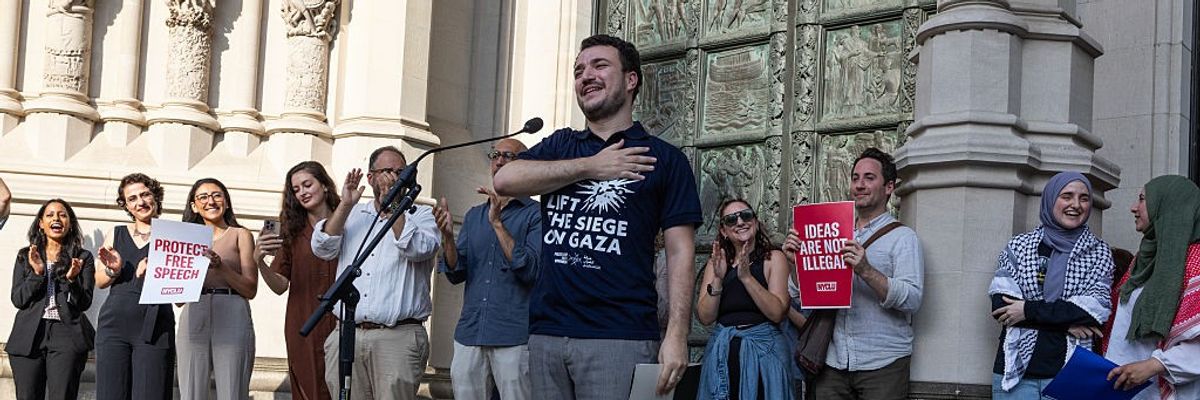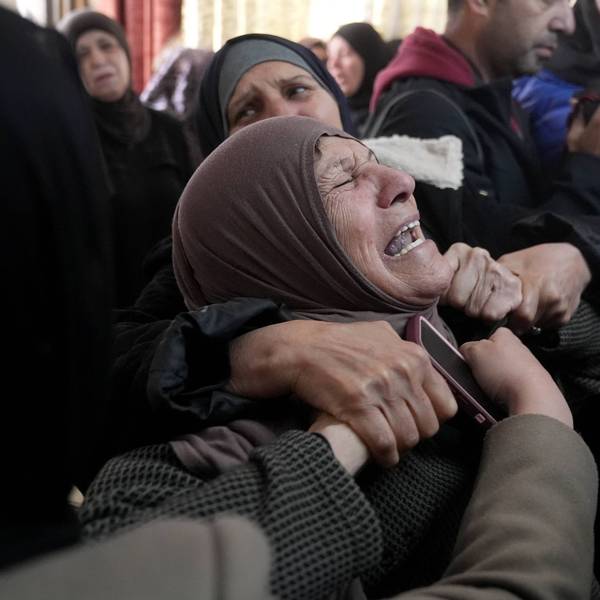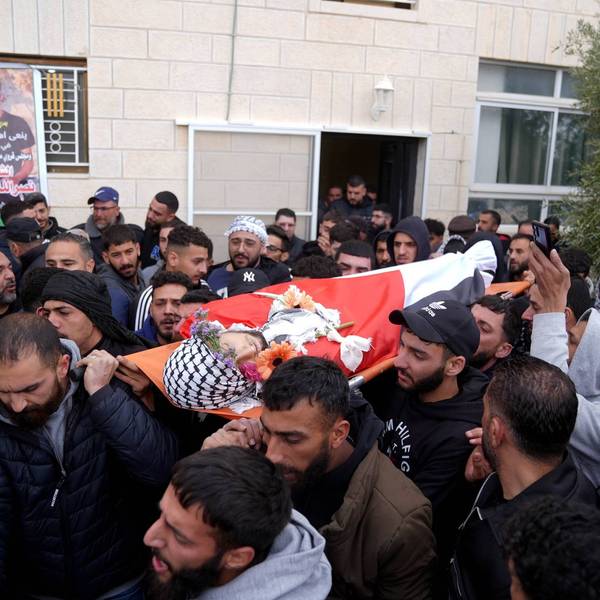
Palestinian activist and former Columbia University student Mahmoud Khalil, who was released from ICE detention, speaks during a rally on the steps of the Cathedral of St. John the Divine on June 22, 2025 in New York City. Khalil was released Friday evening from an Immigration and Customs Enforcement (ICE) facility in Jena, Louisiana, after a U.S. District issued an order granting his release on bail.
Mahmoud Khalil and the Israelification of the US: Wake Up!
Palestinian human rights advocate, Mahmoud Khalil, knows authoritarianism when he sees it. “I lived under the Assad regime [in Syria]. I know how that feels.”
A negotiator for the pro-Palestine student protests on Columbia University's campus in 2024, Khalil and I spoke late last month. Thousands of National Guard had already been deployed to Los Angeles and Washington DC, supposedly to “crack down” on crime, leading to hundreds of arrests and seizures.
Khalil was arrested and seized — by unidentified men, without a warrant, at his home — this March. Snatched away from his pregnant wife he was transported in shackles to an ICE detention center in Louisiana, where he was held for 104 days until a New Jersey judge ordered him to be released. A legal, permanent resident who had committed no violence and broken no law, Khalil’s detention was just the first and most visible abduction in a wave of arrests targeting international students and faculty who were speaking out against genocide in Gaza.
Reflecting on his experience, Khalil said: “I think people mistakenly think that what's happening is far from their doors. They think that this would never happen to them, whether, you know, because of their social status, because of their ethnicity or any of that.”
People call it the “Palestine Exception.” That’s the idea that all sorts of behaviors and speech that are acceptable in other contexts are selectively denied and punished when it comes to advocacy around Palestine. Conversely, many Americans have believed that if they only steer clear of the issue of Palestine and the treatment of Palestinians, their rights to free speech and assembly will be protected and secure; that they will be “safe.”
As we spoke, President Trump (a convicted felon) was ordering National Guard troops to Memphis, Tennessee, and Portland, Oregon, and calling for “expanded deployments” to other places. At a crackpot convening of the nation’s top brass, Trump urged the military to use US cities as “military training grounds” For what? For domination? Occupation?
“What's happening around us should alarm us that this is at our door, it's in our house,” said Khalil.
Palestine may not be the exception, but rather the test. The treatment of Palestinians and human rights advocates like Khalil has tested our tolerance for cruelty and authoritarianism, and until recently, it’s a test that our anti-fascist movements have failed. Go down the list that scholars have compiled. What do authoritarians do? They name an enemy, declare an emergency, and invoke extraordinary, often military powers to shock and intimidate every credible source of opposition and dissent, the law, the media, the academy, free speech, and other politicians. Mahmoud Khalil has seen all those moves up close, and he is far from alone. Speaking in solidarity with Gaza has cost jobs, funding, landed people on watchlists and led to widespread campus arrests.
He thought it couldn't happen here. He thought that in the US, people had rights. Having left Syria and coming to prestigious Columbia University to take up graduate studies with a view to becoming a diplomat, Khalil, too, thought that he was safe:
“I was, to be honest, like I was confident, you know, nothing would happen to me. I never did anything wrong. I literally was protesting a genocide.”
He was wrong, and he learned different, and Americans are also learning.
National Guard and ICE agents have arrived in Portland, where they’ve fired pepper balls at senior citizens, journalists, and shot one priest in the head as he attempted to pray for peace. Federal agents including ICE and Border Patrol have started patrolling the streets of Chicago, where they’ve reportedly shot chemical munitions at civilians in broad daylight.
On September 30, the very next day after Khalil and I talked, federal agents rappelled in darkness from a Black Hawk helicopter onto the roof of a five story building in South Chicago’s South Shore, kicking down doors, deploying flashbang grenades, and forcibly entering nearly every apartment, removing adults and kids, zip tying their hands before separating them from their parents.
“It’s not that the US is becoming authoritarian. It is authoritarianism now,” said Khalil.
Khalil is once again under a deportation order, issued by the same immigration court judge who oversaw his detention in March. Citing paperwork errors on his visa application, he’s once again threatened with deportation to Algeria or Syria where his life would be under threat.
“Americans need to wake up,” said Khalil.
It all makes one think about that Palestinian experience we’re not supposed to speak about. What if, instead of the Palestinian exception, we need to be talking about the Israelification of the U.S.?
An Urgent Message From Our Co-Founder
Dear Common Dreams reader, The U.S. is on a fast track to authoritarianism like nothing I've ever seen. Meanwhile, corporate news outlets are utterly capitulating to Trump, twisting their coverage to avoid drawing his ire while lining up to stuff cash in his pockets. That's why I believe that Common Dreams is doing the best and most consequential reporting that we've ever done. Our small but mighty team is a progressive reporting powerhouse, covering the news every day that the corporate media never will. Our mission has always been simple: To inform. To inspire. And to ignite change for the common good. Now here's the key piece that I want all our readers to understand: None of this would be possible without your financial support. That's not just some fundraising cliche. It's the absolute and literal truth. We don't accept corporate advertising and never will. We don't have a paywall because we don't think people should be blocked from critical news based on their ability to pay. Everything we do is funded by the donations of readers like you. Will you donate now to help power the nonprofit, independent reporting of Common Dreams? Thank you for being a vital member of our community. Together, we can keep independent journalism alive when it’s needed most. - Craig Brown, Co-founder |
A negotiator for the pro-Palestine student protests on Columbia University's campus in 2024, Khalil and I spoke late last month. Thousands of National Guard had already been deployed to Los Angeles and Washington DC, supposedly to “crack down” on crime, leading to hundreds of arrests and seizures.
Khalil was arrested and seized — by unidentified men, without a warrant, at his home — this March. Snatched away from his pregnant wife he was transported in shackles to an ICE detention center in Louisiana, where he was held for 104 days until a New Jersey judge ordered him to be released. A legal, permanent resident who had committed no violence and broken no law, Khalil’s detention was just the first and most visible abduction in a wave of arrests targeting international students and faculty who were speaking out against genocide in Gaza.
Reflecting on his experience, Khalil said: “I think people mistakenly think that what's happening is far from their doors. They think that this would never happen to them, whether, you know, because of their social status, because of their ethnicity or any of that.”
People call it the “Palestine Exception.” That’s the idea that all sorts of behaviors and speech that are acceptable in other contexts are selectively denied and punished when it comes to advocacy around Palestine. Conversely, many Americans have believed that if they only steer clear of the issue of Palestine and the treatment of Palestinians, their rights to free speech and assembly will be protected and secure; that they will be “safe.”
As we spoke, President Trump (a convicted felon) was ordering National Guard troops to Memphis, Tennessee, and Portland, Oregon, and calling for “expanded deployments” to other places. At a crackpot convening of the nation’s top brass, Trump urged the military to use US cities as “military training grounds” For what? For domination? Occupation?
“What's happening around us should alarm us that this is at our door, it's in our house,” said Khalil.
Palestine may not be the exception, but rather the test. The treatment of Palestinians and human rights advocates like Khalil has tested our tolerance for cruelty and authoritarianism, and until recently, it’s a test that our anti-fascist movements have failed. Go down the list that scholars have compiled. What do authoritarians do? They name an enemy, declare an emergency, and invoke extraordinary, often military powers to shock and intimidate every credible source of opposition and dissent, the law, the media, the academy, free speech, and other politicians. Mahmoud Khalil has seen all those moves up close, and he is far from alone. Speaking in solidarity with Gaza has cost jobs, funding, landed people on watchlists and led to widespread campus arrests.
He thought it couldn't happen here. He thought that in the US, people had rights. Having left Syria and coming to prestigious Columbia University to take up graduate studies with a view to becoming a diplomat, Khalil, too, thought that he was safe:
“I was, to be honest, like I was confident, you know, nothing would happen to me. I never did anything wrong. I literally was protesting a genocide.”
He was wrong, and he learned different, and Americans are also learning.
National Guard and ICE agents have arrived in Portland, where they’ve fired pepper balls at senior citizens, journalists, and shot one priest in the head as he attempted to pray for peace. Federal agents including ICE and Border Patrol have started patrolling the streets of Chicago, where they’ve reportedly shot chemical munitions at civilians in broad daylight.
On September 30, the very next day after Khalil and I talked, federal agents rappelled in darkness from a Black Hawk helicopter onto the roof of a five story building in South Chicago’s South Shore, kicking down doors, deploying flashbang grenades, and forcibly entering nearly every apartment, removing adults and kids, zip tying their hands before separating them from their parents.
“It’s not that the US is becoming authoritarian. It is authoritarianism now,” said Khalil.
Khalil is once again under a deportation order, issued by the same immigration court judge who oversaw his detention in March. Citing paperwork errors on his visa application, he’s once again threatened with deportation to Algeria or Syria where his life would be under threat.
“Americans need to wake up,” said Khalil.
It all makes one think about that Palestinian experience we’re not supposed to speak about. What if, instead of the Palestinian exception, we need to be talking about the Israelification of the U.S.?
A negotiator for the pro-Palestine student protests on Columbia University's campus in 2024, Khalil and I spoke late last month. Thousands of National Guard had already been deployed to Los Angeles and Washington DC, supposedly to “crack down” on crime, leading to hundreds of arrests and seizures.
Khalil was arrested and seized — by unidentified men, without a warrant, at his home — this March. Snatched away from his pregnant wife he was transported in shackles to an ICE detention center in Louisiana, where he was held for 104 days until a New Jersey judge ordered him to be released. A legal, permanent resident who had committed no violence and broken no law, Khalil’s detention was just the first and most visible abduction in a wave of arrests targeting international students and faculty who were speaking out against genocide in Gaza.
Reflecting on his experience, Khalil said: “I think people mistakenly think that what's happening is far from their doors. They think that this would never happen to them, whether, you know, because of their social status, because of their ethnicity or any of that.”
People call it the “Palestine Exception.” That’s the idea that all sorts of behaviors and speech that are acceptable in other contexts are selectively denied and punished when it comes to advocacy around Palestine. Conversely, many Americans have believed that if they only steer clear of the issue of Palestine and the treatment of Palestinians, their rights to free speech and assembly will be protected and secure; that they will be “safe.”
As we spoke, President Trump (a convicted felon) was ordering National Guard troops to Memphis, Tennessee, and Portland, Oregon, and calling for “expanded deployments” to other places. At a crackpot convening of the nation’s top brass, Trump urged the military to use US cities as “military training grounds” For what? For domination? Occupation?
“What's happening around us should alarm us that this is at our door, it's in our house,” said Khalil.
Palestine may not be the exception, but rather the test. The treatment of Palestinians and human rights advocates like Khalil has tested our tolerance for cruelty and authoritarianism, and until recently, it’s a test that our anti-fascist movements have failed. Go down the list that scholars have compiled. What do authoritarians do? They name an enemy, declare an emergency, and invoke extraordinary, often military powers to shock and intimidate every credible source of opposition and dissent, the law, the media, the academy, free speech, and other politicians. Mahmoud Khalil has seen all those moves up close, and he is far from alone. Speaking in solidarity with Gaza has cost jobs, funding, landed people on watchlists and led to widespread campus arrests.
He thought it couldn't happen here. He thought that in the US, people had rights. Having left Syria and coming to prestigious Columbia University to take up graduate studies with a view to becoming a diplomat, Khalil, too, thought that he was safe:
“I was, to be honest, like I was confident, you know, nothing would happen to me. I never did anything wrong. I literally was protesting a genocide.”
He was wrong, and he learned different, and Americans are also learning.
National Guard and ICE agents have arrived in Portland, where they’ve fired pepper balls at senior citizens, journalists, and shot one priest in the head as he attempted to pray for peace. Federal agents including ICE and Border Patrol have started patrolling the streets of Chicago, where they’ve reportedly shot chemical munitions at civilians in broad daylight.
On September 30, the very next day after Khalil and I talked, federal agents rappelled in darkness from a Black Hawk helicopter onto the roof of a five story building in South Chicago’s South Shore, kicking down doors, deploying flashbang grenades, and forcibly entering nearly every apartment, removing adults and kids, zip tying their hands before separating them from their parents.
“It’s not that the US is becoming authoritarian. It is authoritarianism now,” said Khalil.
Khalil is once again under a deportation order, issued by the same immigration court judge who oversaw his detention in March. Citing paperwork errors on his visa application, he’s once again threatened with deportation to Algeria or Syria where his life would be under threat.
“Americans need to wake up,” said Khalil.
It all makes one think about that Palestinian experience we’re not supposed to speak about. What if, instead of the Palestinian exception, we need to be talking about the Israelification of the U.S.?

